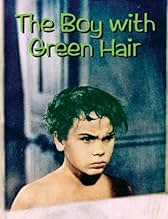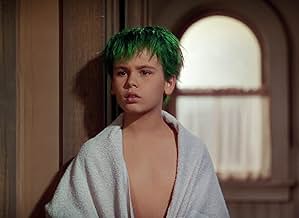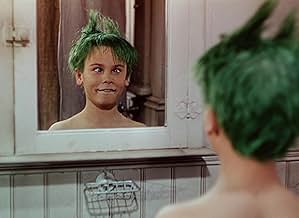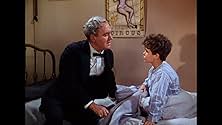NOTE IMDb
6,7/10
3,4 k
MA NOTE
Cette parabole met en scène la réaction de la société lorsque les cheveux d'un orphelin de guerre américain deviennent mystérieusement verts.Cette parabole met en scène la réaction de la société lorsque les cheveux d'un orphelin de guerre américain deviennent mystérieusement verts.Cette parabole met en scène la réaction de la société lorsque les cheveux d'un orphelin de guerre américain deviennent mystérieusement verts.
- Réalisation
- Scénario
- Casting principal
- Récompenses
- 2 victoires au total
Johnny Calkins
- Danny
- (as John Calkins)
Curtis Loys Jackson Jr.
- Classmate
- (as Curtis Jackson)
Peter Brocco
- Bit Part
- (non crédité)
Avis à la une
I saw the Boy With Green Hair a long time ago and it stayed with me. It was hard to imagine all that fuss even back in the 1960'3 over one poor kid who's hair just happened to turn green. But, like others have mentioned consider the times and the era. World war Two had just ended and the Cold War had just begun. I can still remember people picking on"long hairs" in the early sixties because they let their hair grow a bit. This is a very memorable, stay with you classic about tolerance of different people, especially those with no choices in the matter. It is worth watching and renting and possibly buying. Too many movie critics on these pages and with older movies try to applies today norms and political correctness to decades old movies when the norm was different then. The movie is an excellently acted parable. I am surprised it hasn't been released on vhs or dvd or just plain shown more often on some of the cable movie channels. Unlike today, no kid back, especially a boy would have dyed their hair green. It may be a movie from a different era but the message is still the same regardless of the times. It may be dated a little, but it is still a classic.
As the film begins, young Dean Stockwell (as Peter Fry) is in a police station; obviously, the adults do not know where he belongs, or why his head is shaved bald. Robert Ryan (as Dr. Evans) gets young Stockwell to speak, after giving the hungry boy a hamburger. Stockwell tells his story: he was a war orphan, and was shuffled between relatives ("I sure lived in a lot of places"). Finally, he winds up with Pat O'Brien (as "Gramps"), a vaudeville-type actor. He and Mr. O'Brian form a relatively happy family. However, at school, Stockwell is teased, for being an orphan; specifically, he is told he resembles an "Unidentified War Orphan" depicted in a poster. That evening, O'Brien comforts Stockwell, and promises the next day will bring hope in the form of a surprise.
The surprise is, of course, that Stockwell becomes "The Boy with Green Hair". This is a very unusual film, particularly for the time period; it is both thought-provoking, and entertaining. Stockwell and O'Brien are wonderful. "Nature Boy" is a beautiful, and apt, theme song. Stockwell's meeting with the War Poster children is very well done - still, quiet, and effective. However, the themes of "peace" and "tolerance" could be better connected. And, there are some minor story difficulties; for example, the milkman couldn't possibly be responsible for the green hair, unless Stockwell is the only milk drinker in town (stipulating the townspeople, as a whole, are of average intelligence). Still, a lovely film about being different, which we all are.
******* The Boy with Green Hair (11/16/48) Joseph Losey ~ Dean Stockwell, Pat O'Brien, Robert Ryan
The surprise is, of course, that Stockwell becomes "The Boy with Green Hair". This is a very unusual film, particularly for the time period; it is both thought-provoking, and entertaining. Stockwell and O'Brien are wonderful. "Nature Boy" is a beautiful, and apt, theme song. Stockwell's meeting with the War Poster children is very well done - still, quiet, and effective. However, the themes of "peace" and "tolerance" could be better connected. And, there are some minor story difficulties; for example, the milkman couldn't possibly be responsible for the green hair, unless Stockwell is the only milk drinker in town (stipulating the townspeople, as a whole, are of average intelligence). Still, a lovely film about being different, which we all are.
******* The Boy with Green Hair (11/16/48) Joseph Losey ~ Dean Stockwell, Pat O'Brien, Robert Ryan
I, too, first saw this film a little while after it came out, when I was younger than the main character was supposed to be. It has stayed with me for the next half-century, and I considered myself very lucky to find a video in a sale bin about ten years ago.
Really, it foreshadowed the '60's - it is not only about the fact that being different should be OK, but more about the consequences of intolerance, about folks' reactions, their illogic, and where those reactions can take us. This is all done with a nice soupcon of fantasy to make the moral point easy to understand (subtlety isn't the film's strong point).
There's a story in the newspapers about a twelve-year-old boy in 6th grade who last week came to school with hair dyed green for St. Patrick's day, incidentally. Three guesses what happened to him....
See this movie.
Really, it foreshadowed the '60's - it is not only about the fact that being different should be OK, but more about the consequences of intolerance, about folks' reactions, their illogic, and where those reactions can take us. This is all done with a nice soupcon of fantasy to make the moral point easy to understand (subtlety isn't the film's strong point).
There's a story in the newspapers about a twelve-year-old boy in 6th grade who last week came to school with hair dyed green for St. Patrick's day, incidentally. Three guesses what happened to him....
See this movie.
'The Boy with Green Hair (1948)' feels very much like a British film. I'm not quite sure why, but it's probably not because of Pat O'Brien's would-be Irish accent. The manner in which director Joseph Losey blends vivid working-class realism with elements of fantasy reminded me of Carol Reed's 'A Kid for Two Farthings (1955).' Both films feature a boy protagonist using fantasy to find solace amid the harsh realities of life – in Peter Fry's case, to come to terms with the death of both parents during the London Blitz. Young Dean Stockwell, who the previous year had played Nick Charles Jr. in 'Song of the Thin Man (1947),' gives a surprisingly mature and sensitive performance as the youth whose hair inexplicably turns green one morning. Displaying unique range for an actor of his age (and upstaging his adult co-stars), Stockwell oscillates between fresh-faced enthusiasm, timidity, resolution, and, in the film's framing sequences, a hardened resentment towards society.
Losey released his film in the relative calm between the end of World War Two and the slowly escalating Cold War, when the United States was still coming to terms with its losses. Far from simply being a fluffy, imaginative children's film, 'The Boy with Green Hair' has more ambitious aspirations, an anti-war film only years after Hollywood collectively urged audiences to stand up and fight. Given that the director was later blacklisted for alleged Communist affiliations, one finds it tempting to regard his film as political allegory of sorts. Stockwell's Peter Fry is an ordinary boy, liked and respected by his friends and acquaintances throughout town. Then he is physically branded with an arbitrary label, one that doesn't change the sort of person he was or is, but that is nevertheless viewed by society as unnatural and potentially dangerous. He is ostracised, harassed, and abandoned by his friends, ultimately forced to flee their persecution. Peter Fry was labeled with green hair; Losey, and hundreds like him, was labelled a Communist.
Every time I watch a film with Pat O'Brien he's forced to play it straight, so it was good to see him having some fun as Gramps, a faded Irish vaudeville performer who takes Stockwell's war orphan into his home and proudly adopts him as a grandson. Behind the hammy accent there's something distinctly wistful about O'Brien's performance, the ghost of a tired old man clinging to his long-gone youth, unable to properly nurture the next generation because he never grew up himself. Robert Ryan also appears as a child psychologist who interviews Peter, but he's not given anything much to do aside from listening to the boy's story, his characteristic intensity temporarily subdued. The film is shot in sumptuous Technicolor that almost looks too vibrant to be real, pushing the border between reality and imagination. Overall, 'The Boy with Green Hair' is both an intriguing children fantasy and a powerful anti-war fable, tinged with that childhood innocence that makes every ideal seem so attainable.
Losey released his film in the relative calm between the end of World War Two and the slowly escalating Cold War, when the United States was still coming to terms with its losses. Far from simply being a fluffy, imaginative children's film, 'The Boy with Green Hair' has more ambitious aspirations, an anti-war film only years after Hollywood collectively urged audiences to stand up and fight. Given that the director was later blacklisted for alleged Communist affiliations, one finds it tempting to regard his film as political allegory of sorts. Stockwell's Peter Fry is an ordinary boy, liked and respected by his friends and acquaintances throughout town. Then he is physically branded with an arbitrary label, one that doesn't change the sort of person he was or is, but that is nevertheless viewed by society as unnatural and potentially dangerous. He is ostracised, harassed, and abandoned by his friends, ultimately forced to flee their persecution. Peter Fry was labeled with green hair; Losey, and hundreds like him, was labelled a Communist.
Every time I watch a film with Pat O'Brien he's forced to play it straight, so it was good to see him having some fun as Gramps, a faded Irish vaudeville performer who takes Stockwell's war orphan into his home and proudly adopts him as a grandson. Behind the hammy accent there's something distinctly wistful about O'Brien's performance, the ghost of a tired old man clinging to his long-gone youth, unable to properly nurture the next generation because he never grew up himself. Robert Ryan also appears as a child psychologist who interviews Peter, but he's not given anything much to do aside from listening to the boy's story, his characteristic intensity temporarily subdued. The film is shot in sumptuous Technicolor that almost looks too vibrant to be real, pushing the border between reality and imagination. Overall, 'The Boy with Green Hair' is both an intriguing children fantasy and a powerful anti-war fable, tinged with that childhood innocence that makes every ideal seem so attainable.
When I was little I saw this movie on tv. It made an impact that never left me. It is a "B" movie, but the message of cruelty to those that are different is an "A". I don't know if it would have had the same impact on me had I been an adult when I first saw it, but the message is still with me today. Sometimes I wish young kids today could see this movie, I wonder if it might make an impact on them also.
Le saviez-vous
- AnecdotesUnfortunately for the film's director, Joseph Losey, the eccentric, politically conservative Howard Hughes took over RKO while this film was being shot and, hating the film's pacifist message, did his best to sabotage it. Losey, however, managed to protect the integrity of his project. Screenwriter Ben Barzman, who was also later blacklisted along with Losey, would later recall that "Joe shot the picture in such a way that there wasn't much possibility for change. A few lines were stuck in here and there to soften the message, but that was about it." Barzman also remembered that 12-year-old Dean Stockwell was called into Hughes' office, and Hughes told him that when the other children spoke of the horror of war, he should say, "And that's why America has gotta have the biggest army, and the biggest navy, and the biggest air force in the world!" According to Barzman, little Stockwell was so in sympathy with the film's message that he dared to respond, "No, sir!" Even after Hughes started to scream at him, the boy held his ground and refused to do it. Dean Stockwell later played Howard Hughes in Tucker: L'homme et son rêve (1988).
- GaffesWhen the barber is preparing to cut his hair, a close-up shot shows a chunk of cut hair on his right side. Then when the barber begins cutting, it's not there. But re-appears for the next close-up of him crying.
- Crédits fousDean Stockwell is credited simply as "The Boy" in the opening credits and as "Peter" in the end credits complete cast of characters.
Meilleurs choix
Connectez-vous pour évaluer et suivre la liste de favoris afin de recevoir des recommandations personnalisées
- How long is The Boy with Green Hair?Alimenté par Alexa
Détails
- Date de sortie
- Pays d’origine
- Langue
- Aussi connu sous le nom de
- El niño del cabello verde
- Lieux de tournage
- Société de production
- Voir plus de crédits d'entreprise sur IMDbPro
- Durée
- 1h 22min(82 min)
- Rapport de forme
- 1.37 : 1
Contribuer à cette page
Suggérer une modification ou ajouter du contenu manquant
























